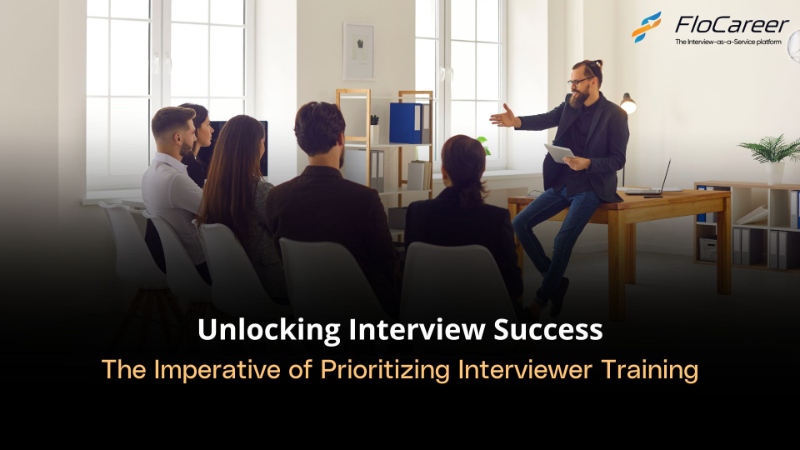Unlocking Interview Success: The Imperative of Prioritizing Interviewer Training.
In the intricate dance of recruitment, the role of interviewers is paramount. Crafting a fair and balanced hiring process necessitates a profound commitment to interviewer training. By providing interviewers with the essential skills and tools, organizations create a robust safeguard against unconscious bias. This commitment, in turn, fosters an environment where well-informed and equitable hiring decisions can flourish. In this exploration, we unravel the crucial reasons why prioritizing interviewer training is not just a choice but a strategic imperative for organizations striving for excellence.

Read: Choosing the Ideal Platform for Interview Outsourcing Excellence
Mitigating Unconscious Bias: The Cornerstone of Equitable Hiring
Understanding Unconscious Bias:
Unconscious bias is an inherent challenge in the hiring process, where interviewers may unintentionally favor or disfavor candidates based on characteristics unrelated to their qualifications. These biases can stem from various factors such as age, gender, ethnicity, or even subtle cues during the interview.
The Role of Interviewer Training:
Investing in interviewer training is a proactive measure to address unconscious bias. Training equips interviewers with the awareness and tools to recognize and mitigate bias, ensuring that evaluations are based on merit and qualifications rather than subjective judgments.
Elevating the Interviewer Skill Set: A Win-Win for Candidates and Employers
1. Effective Questioning Techniques:
Interviewer training goes beyond the basics, focusing on refining questioning techniques. This involves teaching interviewers to pose questions that assess a candidate's skills, experiences, and competencies objectively. Well-crafted questions lead to more insightful responses, providing a clearer picture of a candidate's suitability for the role.
2. Active Listening Skills:
Active listening is a fundamental yet often overlooked skill. Interviewer training emphasizes the importance of attentive listening, enabling interviewers to grasp nuances in candidate responses and ask follow-up questions that delve deeper into their qualifications.
3. Assessment Consistency:
Consistency in assessment is crucial for fairness. Interviewer training ensures that all interviewers within an organization adhere to standardized evaluation criteria. This consistency minimizes the risk of variations in assessments, leading to more reliable hiring decisions.
Cultivating a Culture of Excellence: The Ripple Effect of Training
4. Boosting Confidence and Professionalism:
Well-trained interviewers exude confidence and professionalism. This not only enhances the candidate experience but also contributes to the overall reputation of the organization. A positive interview encounter reflects positively on the employer brand, attracting top-tier talent.
5. Reducing Turnover Rates:
Equipping interviewers with effective skills can result in better hiring decisions, ultimately reducing turnover rates. When interviewers are adept at identifying candidates who align with the organization's values and goals, employees are more likely to thrive in their roles, leading to increased job satisfaction and retention.
Navigating Diversity: The Role of Inclusive Interviewer Training
6. Cultural Competency:
In today's globalized workforce, cultural competency is vital. Interviewer training should include components that educate interviewers on recognizing and appreciating diverse backgrounds, experiences, and perspectives. This ensures that candidates from all walks of life feel understood and valued during the interview process.
Read: Mastering the Art of Conducting High-Quality Interviews
7. Language Sensitivity:
Language barriers can inadvertently introduce bias into the interview process. Inclusive training emphasizes language sensitivity, guiding interviewers on effective communication with candidates for whom English may not be the first language. This ensures that language differences do not overshadow a candidate's true capabilities.
8. Disability Awareness:
Prioritizing interviewer training includes fostering awareness about disability inclusion. Interviewers should be trained to provide reasonable accommodations and assess candidates based on their skills and qualifications, rather than making assumptions about their capabilities related to disabilities.
Data-Driven Decision Making: The Analytics Advantage of Training
9. Data Analysis Skills:
Interviewer training should extend to data analysis skills, empowering interviewers to leverage quantitative insights. Training interviewers to analyze data related to candidate assessments helps organizations identify trends, strengths, and areas for improvement in their hiring processes.
10. Continuous Improvement Mindset:
Instilling a continuous improvement mindset is a key aspect of interviewer training. Interviewers should be encouraged to reflect on their assessments, seek feedback, and adapt their approaches based on evolving organizational needs and industry best practices.
Enhancing Virtual Interview Competency: Adapting to the New Normal
11. Virtual Interview Best Practices:
With the rise of remote work, interviewer training should encompass best practices for virtual interviews. This includes guidance on creating a professional virtual environment, using video conferencing tools effectively, and maintaining engagement during digital interactions.
12. Virtual Body Language Interpretation:
Training interviewers to interpret virtual body language is crucial in the absence of in-person cues. Understanding nuances like facial expressions, posture, and tone of voice in a virtual setting ensures a comprehensive evaluation of a candidate's communication skills and demeanor.
Flocareer's Commitment to Comprehensive Training
Flocareer's approach to interviewer training extends beyond the conventional, covering diverse dimensions that contribute to a holistic evaluation process. From mitigating unconscious bias to fostering inclusive practices and adapting to the virtual interview landscape, Flocareer's training programs equip interviewers with the skills needed for success in a dynamic hiring environment.
Outsourcing interviews with Flocareer not only provides access to highly trained interviewers but also ensures that organizations benefit from the continuous improvement mindset embedded in Flocareer's training philosophy. This commitment guarantees that interviewers stay at the forefront of industry advancements, delivering value to organizations seeking excellence in their talent acquisition strategies.
A Strategic Imperative for Future-Ready Hiring
As organizations navigate the complexities of modern talent acquisition, prioritizing interviewer training is no longer optional—it is a strategic imperative. From mitigating biases to fostering diversity and adapting to the evolving interview landscape, comprehensive training sets the stage for organizations to make well-informed, equitable, and forward-thinking hiring decisions.
Elevate your hiring process with interviewer training that goes beyond the basics. Consider the advantages of interview outsourcing with Flocareer, where expertise, diversity, and continuous improvement converge to shape a recruitment strategy that stands the test of time.


